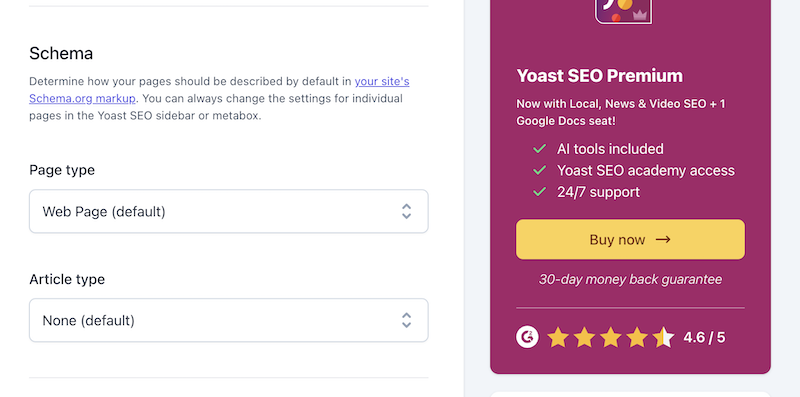Structured AF™ vs Yoast SEO: Schema Comparison for Course Creators (2025)
I used Yoast for years. It’s a solid plugin and genuinely good at what it does. But here’s what I discovered when I actually looked at the schema it was generating for my online courses, consultations, and digital products: virtually nothing beyond ‘this is a blog post’.
And then there was the bigger problem: my business doesn’t live entirely on WordPress. I’ve had ConvertKit landing pages for my freebies, Calendly for bookings, and Dubsado for client management. Yoast couldn’t touch any of that.
What Yoast SEO Does Brilliantly
Yoast SEO is excellent for:
- Content creators and bloggers on WordPress
- Basic on-page SEO (meta descriptions, titles, readability)
- FAQ and HowTo content with their blocks
- Sites that are primarily publishing articles
If you’re running a WordPress blog or content site, Yoast is genuinely one of the best tools available. The free version handles fundamentals well, and their interface is intuitive.
The WordPress-Only Reality: Yoast SEO is a WordPress plugin that automatically implements Schema.org markup for your page types Schema SEO with Yoast SEO: Implementation Guide • Yoast – but only for pages on your WordPress site.
This means:
- Your ConvertKit landing page for your freebie? No Yoast schema.
- Your Calendly booking page? No Yoast schema.
- Your Dubsado proposal templates? No Yoast schema.
- Your external course platform? No Yoast schema.
For online business owners who use multiple platforms, this creates a scattered organization problem: your WordPress site has one type of schema, but the rest of your business presence has nothing – or worse, conflicting signals.
Where the Gap Appears for Online Business Owners
When I tested Yoast’s schema output for real business offerings, here’s what I found:

The schema types available are focused on content types, not business offerings:
- Article (and variants like TechArticle, NewsArticle)
- WebPage (and variants like ContactPage, AboutPage)
- FAQ via blocks
- HowTo via blocks
What’s not included for business owners:
- Course schema with start/end dates, pricing, instructor details
- Service schema with availability and booking integration
- Detailed professional credentials beyond basic Person markup
- Offer schema for freebies, digital products or consultations
This isn’t a criticism of Yoast – they built a plugin for bloggers and content creators, which is what most WordPress users needed in 2015. But if you’re selling courses, consultations, or digital products in 2025, you need different signals.
The Scattered Business Problem
Here’s the reality for most online business owners:
Your business presence lives across multiple platforms:
- WordPress website (homepage, blog, about page)
- ConvertKit (opt-in pages, email sequences with landing pages)
- Calendly (booking pages for consultations)
- Dubsado (client portals, proposals, contracts)
- Course platforms (Teachable, Thinkific, Kajabi)
Yoast only works on one of these.
This creates a scattered identity problem for AI engines:
- WordPress pages say “Organization: Jane Smith Coaching”
- ConvertKit pages have no organization schema (or generic default)
- Calendly pages have no schema connecting to your business
- Your course platform has its own schema (if any)
AI engines see disconnected pieces, not one cohesive business. They can’t confidently say “Jane Smith offers coaching courses” because the signals are fragmented across platforms with no unifying schema.
The AI Visibility Problem
Here’s what matters now: AI engines like ChatGPT and Perplexity look for specific business signals to understand what you actually offer.
When your course page only has “Article” schema, AI engines see:
- A piece of content about courses
- Not an actual course offering
When your ConvertKit landing page has no schema at all, AI engines see:
- Just text and images
- No clear business offering signal
Yoast’s schema approach creates an interconnected graph, which is technically sophisticated Schema SEO with Yoast SEO: Implementation Guide • Yoast, but the graph only includes the pieces they’ve built – primarily blog-focused content types – and only works on WordPress.
StructuredAF creates one unified schema across ALL your platforms – WordPress, ConvertKit, Calendly, Dubsado, anywhere you paste a single line of code. One organization identity, consistent business signals, cohesive AI visibility.
Feature Comparison Table
| What Online Businesses Need | Yoast SEO (Free) | Yoast SEO Premium | Structured AF™ |
| Course schema with dates/pricing | – | – | ✅ |
| Service schema with availability | – | – | ✅ |
| Professional credentials encoding | Basic | Basic | Detailed |
| Offer schema for digital products | – | – | ✅ |
| Event schema for launches | Requires plugin | requires plugin | ✅ |
| Works on ConvertKit pages | – | – | ✅ |
| Works on Calendly pages | – | – | ✅ |
| Works on Dubsado pages | – | – | ✅ |
| Works on ANY platform | – | – | ✅ |
| AI-optimised business signals | – | – | ✅ |
| Unified organization schema | WordPress only | WordPress only | ✅ |
| Incorporated Social media integrations | – | ✅ | ✅ |
When to Use What
Choose Yoast SEO if:
- You’re primarily blogging or publishing content
- You need solid on-page SEO fundamentals
- Your entire business lives on WordPress
- Your business model is ad revenue or affiliate content
- You’re happy managing schema for business offerings manually via code
- You’re confident your host is not blocking AI crawlers
Choose StructuredAF if:
- You sell courses, consultations, or digital products
- You use external platforms (ConvertKit, Calendly, Teachable)
- You want AI engines to understand your business offerings everywhere
- You need business-specific schema without touching code
- You want one unified organization identity across all platforms
- You want to fly under the radar of any AI-blocking technologies such as Labyrinth AI
Use both if:
- You want Yoast for content SEO + Structured AF™ for business schema
- They work alongside each other without conflict
- You get the best of both: Yoast’s WordPress SEO tools + Structured AF™’s universal business schema
The Pricing Reality
Yoast SEO Free: $0 (WordPress only) Yoast SEO Premium: $118.80/year per site (WordPress only)
- Over 3 years for one site: $356.40
- Features: AI title generation, redirect manager, multiple keywords
- Platform limitation: WordPress installations only
StructuredAF: $297 one-time
- Lifetime access, no recurring fees
- Works on any platform: WordPress, ConvertKit, Calendly, Dubsado, custom sites, anywhere
- Includes: All business schema types, unlimited updates, unified organization identity
Neither is ‘better’ – they solve different problems. Yoast excels at WordPress content SEO. I built StructuredAF specifically for the schema signals online businesses need across every platform they use.
Q&A
Can I use Structured AF™ and Yoast together? Yes. Yoast handles your content-level SEO (meta descriptions, readability, sitemaps) while Structured AF™ adds business-specific schema. They complement rather than conflict.
Does Yoast generate Course schema? No. Yoast automatically implements WebPage and Article schema by default Schema SEO with Yoast SEO: Implementation Guide • Yoast, with options for FAQ and HowTo via blocks, but Course schema isn’t currently supported.
Will Structured AF™ work on my WordPress site if I have Yoast installed? Yes. StructuredAF schema is additive and doesn’t interfere with Yoast’s output. Many users run both.
Which is better for AI visibility? For business offerings (courses, services, consultations), Structured AF™ provides the specific schema types AI engines look for. Yoast excels at content-level optimisation but doesn’t include business offering schema.
Is Yoast’s Premium version worth it for online business owners? Yoast Premium ($118.80/year) adds AI-powered title generation, redirect management, multiple focus keywords, and internal linking suggestions Yoast SEO free vs Premium: why upgrading is worth it • Yoast. These are valuable content SEO features, but Premium doesn’t add business schema types like Course or Service.
I didn’t build Structured AF™ because Yoast is bad – I built it because Yoast wasn’t designed for what online business owners actually need in 2025. If you’re selling courses or consultations, you need schema that tells AI engines ‘this is a business offering’ not ‘this is a blog post about business.’
Both tools have their place. Choose based on what you’re actually doing.








